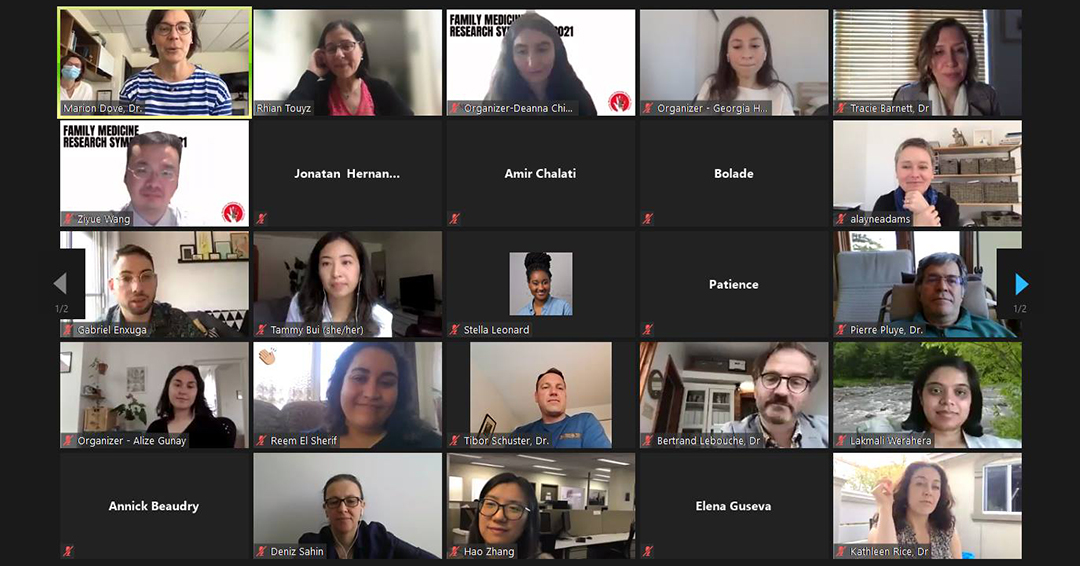
The McGill Family Medicine Research Symposium is an annual conference organized by the Family Medicine Graduate Student Society (FMGSS) with the support of the Family Medicine Research Division. Created to celebrate student research, the first iteration of the symposium was first held in 2015, to provide a space and resources for graduate students, research assistants and post-doctoral fellows to showcase their research projects with their peers, faculty and the broader community. It also aims to stimulate discussions between students and the Family Medicine faculty, while providing an opportunity for students to practice communicating their research findings. All graduate students, research assistants and post-doctoral fellows are encouraged to submit an abstract to the symposium. These submissions usually take the form of a summary of their protocol or (preliminary) results, depending on the stage of their research, and the top presentations are rewarded. The symposium also hosts panel discussions or guest speakers who present their timely research or discuss crucial topics in the disciplines of Family Medicine, Primary Healthcare and Public Health.
Khandideh Williams, VP Academic of FMGSS, supervised an organization committee of nine and led the planning at each step of this year’s symposium. “Unfortunately, the 2020 McGill Family Medicine Research Symposium was cancelled due to the unprecedented events surrounding the onset of the COVID-19 pandemic, but I refused to succumb to the idea of cancelling the symposium for a second time,” shares Khandideh. She worked closely with Marwa Ilali, VP Internal of FMGSS and Lead of Logistics for the Research Symposium, to ensure adequate planning around using the Zoom software for this event and to guarantee that back up plans were in place in case of any technical challenges.
The symposium was a two-day virtual event where students and research assistants from diverse disciplines within the Faculty of Medicine and Health Sciences presented their research about health, healthcare or healthcare systems. Presentations took one of three forms: live oral, pre-recorded oral, or poster presentations. The top abstracts were published in the McGill Journal of Medicine. In addition, the symposium featured two expert panel discussions. The first panel, on May 13, 2021, focused on the impacts of COVID-19 on health and healthcare research. The panelists were Dr. Kathleen Rice, Dr. Joanna Merckx and Dr. Vladimir Khanassov. The second panel, on May 14, 2021, dealt with the subject of participatory approaches in health research and the panelists were Mr. Vincent Dumez, Dr. Susan Bartlett and Dr. Bertrand Lebouché.
This year, the executive members of the FMGSS voted to donate all proceeds of the event to Resilience Montreal, a non-profit day shelter that provides a safe space for people experiencing homelessness in Montreal and, specifically, residents of Cabot Square. “Some of the reasons that informed our decision included the fact that Resilience Montreal services target a vulnerable segment of the population whose precarity was greatly increased during the pandemic,” explains Khandideh. “A large proportion of the population that they serve is Indigenous, and much of the healthcare literature demonstrates the health and healthcare challenges and disparities within that demographic. Resilience Montreal is doing crucial work in serving a community that is especially vulnerable to poor health and we agreed that any contributions we obtained via the symposium would go a long way in helping those in need.”
The symposium featured 19 student and research assistant presentations. The top presentations received monetary awards: four prizes of $500 were awarded to students, in addition to one prize of $100. “I am extremely happy with the outcome of this year’s symposium. Since it was the first virtual Family Medicine Research Symposium, and the first major event that I led, it required much trial and error. Still, I am very happy that I was able to put it together with the help and support of members of the organizing committee and the Department’s Research Division,” says Khandideh.
Dr. Isabelle Vedel, Director of the MSc Program in the Department of Family Medicine, applauds the efforts of the FMGSS organizing committee members. “The panel discussions were fantastic and student presentations were rich and inspiring. We know that it takes a lot of time to organize such an event and we are very appreciative of the additional efforts put into this event beyond the students’ courses and thesis work. Despite the current online context, it was well organized and allowed networking. The symposium was very well attended.”
By Yasmine Elmir
